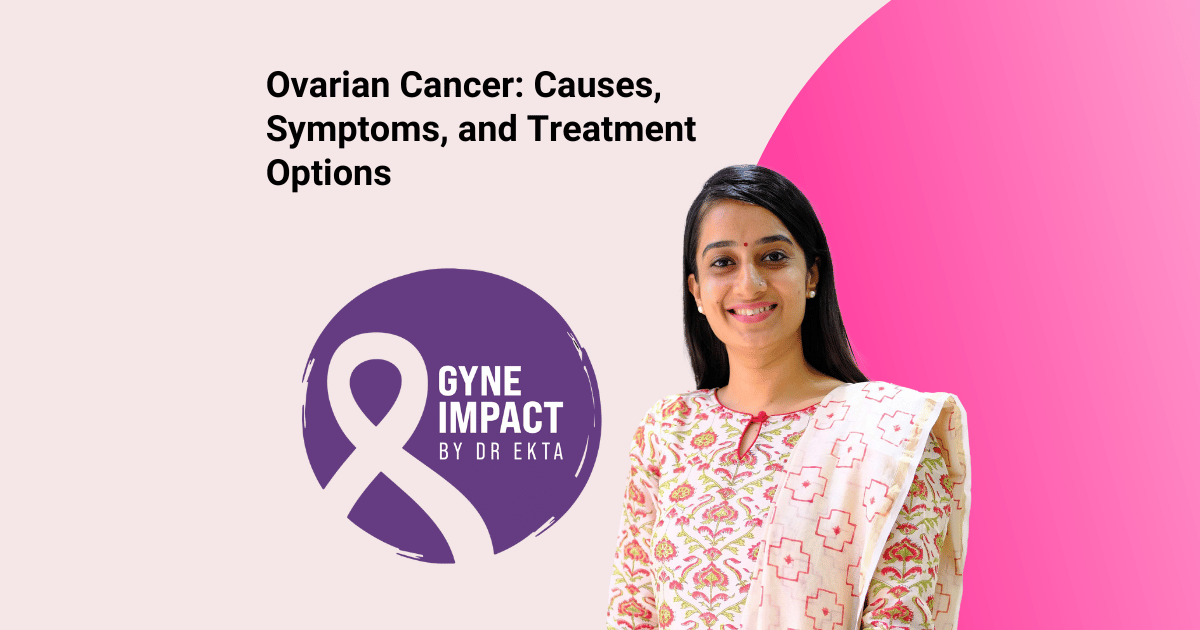Hello, I’m Dr. Ekta Vala, committed to supporting women through their health challenges. Together, let’s embark on a journey to delve deeper into the complexities of this disease, from its nuanced causes to the array of treatment options available.
Causes of Ovarian Cancer:
Ovarian cancer is a multifaceted condition influenced by a variety of factors. While we have made significant strides in understanding its origins, there remains much to uncover. Among the contributing factors are genetic predisposition, family history, age, hormonal influences, and certain lifestyle choices. For instance, women with mutations in the BRCA1 or BRCA2 genes have a higher risk of developing ovarian cancer.
Additionally, age plays a significant role, with the risk increasing as women grow older. Hormonal factors, such as early menstruation or late menopause, may also impact ovarian cancer risk. Furthermore, lifestyle choices such as smoking, obesity, and a diet high in processed foods have been linked to an increased risk of developing this disease. By comprehensively understanding these factors, we empower ourselves to make informed decisions regarding our health and risk-reduction strategies.
Symptoms of Ovarian Cancer:
Recognizing the symptoms of ovarian cancer is crucial for early detection and timely intervention. Unfortunately, this disease often presents with subtle or nonspecific symptoms, leading to delayed diagnosis. Common symptoms include persistent abdominal bloating or swelling, pelvic discomfort or pain, changes in bowel habits, frequent urination, and unexplained weight loss.
Additionally, some women may experience fatigue, back pain, or indigestion. While these symptoms may not necessarily indicate ovarian cancer, they should prompt further evaluation by a healthcare professional, especially if they persist for more than a few weeks. By being vigilant and proactive about our health, we increase the likelihood of early diagnosis and improved treatment outcomes.
Diagnosis and Screening:
Early detection is paramount in the management of ovarian cancer. While there are currently no routine screening tests recommended for the general population, several diagnostic methods can aid in the detection of this disease. Pelvic examinations, transvaginal ultrasound, and blood tests to measure biomarkers such as CA-125 can provide valuable information.
Additionally, genetic testing for inherited mutations associated with ovarian cancer, such as BRCA1 and BRCA2, may be recommended for individuals with a family history of the disease or other risk factors. By undergoing regular check-ups and discussing any concerns with our healthcare providers, we empower ourselves to take proactive steps towards early detection and intervention.
Treatment Options:
Treating ovarian cancer requires a multidisciplinary approach tailored to each patient’s individual circumstances. Surgery is often the initial step in treatment, with the goal of removing the tumor and any affected tissues. The extent of surgery will depend on factors such as the stage and location of the cancer, as well as the patient’s overall health and preferences. Following surgery, chemotherapy is frequently administered to target any remaining cancer cells and reduce the risk of recurrence.
In some cases, targeted therapy or hormone therapy may be recommended, particularly for tumors with specific molecular characteristics. By collaborating closely with our healthcare team and actively participating in treatment decisions, we can optimize our chances of successful outcomes and minimize the impact of ovarian cancer on our lives.
Clinical Trials and Emerging Therapies:
Clinical trials play a critical role in advancing our understanding and treatment of ovarian cancer. These studies evaluate new therapies, treatment combinations, and diagnostic approaches with the aim of improving outcomes for patients. Participating in clinical trials not only provides access to innovative treatments but also contributes to the collective knowledge that drives progress in the field. Emerging therapies in ovarian cancer treatment include immunotherapy, which harnesses the body’s immune system to target cancer cells, and precision medicine, which utilizes genetic testing to identify personalized treatment approaches. By staying informed about ongoing research and considering participation in clinical trials, we can play an active role in shaping the future of ovarian cancer care and potentially benefit from cutting-edge treatments.
Support and Resources:
Facing a diagnosis of ovarian cancer can be overwhelming, but it’s important to remember that we are not alone. A wide range of support services, resources, and organizations are available to provide assistance, information, and emotional support throughout our journey. These may include support groups, online communities, counseling services, and patient advocacy organizations. Connecting with others who understand our experiences can provide comfort, encouragement, and practical advice as we navigate the challenges of ovarian cancer. Additionally, healthcare providers, social workers, and other members of our care team are valuable sources of support and guidance. By seeking out and utilizing available resources, we can strengthen our support network and enhance our ability to cope with the challenges of ovarian cancer.
Conclusion:
Ovarian cancer is a complex and challenging disease, but by understanding its causes, recognizing its symptoms, and exploring available treatment options, we empower ourselves to take control of our health and well-being. Through early detection, personalized treatment approaches, and ongoing support, we can confront ovarian cancer with resilience, courage, and hope. Together, let’s continue to raise awareness, advocate for research, and support one another in the fight against ovarian cancer. By joining forces and sharing our experiences, we can make a meaningful difference in the lives of women affected by this disease.

